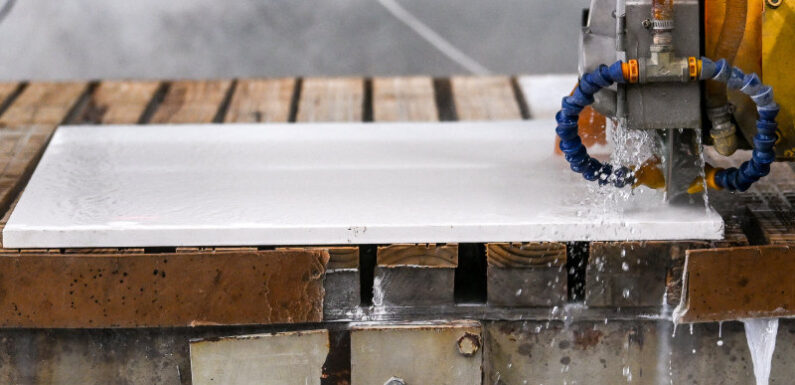
Save articles for later
Add articles to your saved list and come back to them any time.
A landmark report calling for engineered stone to be banned blames poor government and industry standards for failing tradies who have contacted silicosis and says the $251 million cost of prohibiting the substance used in kitchen benchtops is outweighed by the risk to workers.
The Safe Work Australia report – kept secret by federal, state and territory ministers for more than two months – says manufacturers, importers and small businesses did not warn stonemasons of the danger of working with lethal crystalline silica in the slabs installed in up to three million households nationwide.
Engineered stone, widely used in kitchen benchtops, can cause the deadly lung disease silicosis.Credit: Eddie Jim
“To date, we … have failed to ensure the health and safety of all workers working with engineered stone,” Safe Work said of regulators, government agencies, businesses within the industry and their workers.
“The only way to ensure that another generation of Australian workers do not contract silicosis from such work is to prohibit its use, regardless of its silica content.”
The report was released on Friday afternoon following a national meeting of workplace safety ministers, helmed by federal Workplace Relations Minister Tony Burke, after the federal, state and territory leaders commissioned the watchdog to investigate the effects of a potential ban.
Dubbed “the new asbestos” by Burke, engineered stone can contain up to 95 per cent crystalline silica and is responsible for a surge in irreversible lung disease in stonemasons and other tradespeople.
An investigation by this masthead and 60 Minutes earlier this year revealed a growing number of workers were battling the debilitating symptoms of the lung disease silicosis while state-based regulators failed to effectively police workplaces to guard against the dangers associated with inhaling crystalline silica dust.
The report also says the nature of the industry arguably contributed to safety standards being flouted and exacerbated the spread of cases.
“It is comprised of mostly small businesses with few barriers to entry and a lower understanding of [workplace health and safety] obligations,” the report says.
It also targeted importers and manufacturers for providing businesses with inadequate information on the hazards associated with engineered stone, creating confusion.
“Importers, suppliers and manufacturers of engineered stone products have failed to comply with their upstream duties to ensure these products are without risks to health and safety of the workers who will use the products,” the report says.
The report’s authors have rejected the claim that any form of engineered stone could be safe to handle, finding that manufacturers have not scientifically established that “these products are without risks”.
“There is no toxicological evidence of a ‘safe’ threshold of crystalline silica content, or that the other components of lower-silica engineered stone products (e.g. amorphous silica including recycled glass, feldspar) do not pose additional risks to worker health.”
The report assessed the total cost of banning engineered stone would be $251.1 million, which included a $140 million hit to businesses, and $108 million to governments.
“The cost to industry, while real and relevant, cannot outweigh the significant costs to Australian workers, their families and the broader community that result from exposure to RCS from engineered stone,” the report says.
Burke stopped short of calling for a national, blanket ban on Friday when asked, saying that decision rested with the states.
“I don’t think it’s reasonable for us to be making a final decision without the public knowing what’s in the report. There have been calls in the lead-up to this meeting for the public release of the report. I wanted to be able to do that but didn’t get the agreement,” he told ABC’s RN Breakfast.
Construction, Forestry, Maritime, Mining and Energy Union national secretary Zach Smith said every day ministers delayed banning the product, more workers would be given a death sentence.
“Any delay is contributing to the deaths that this product is causing,” he said, describing the further delay as disappointing.
“We need a ban before the end of this year, anything other than that is a moral abrogation of their duties”.
Cut through the noise of federal politics with news, views and expert analysis from Jacqueline Maley. Subscribers can sign up to our weekly Inside Politics newsletter here.
Most Viewed in Politics
From our partners
Source: Read Full Article
